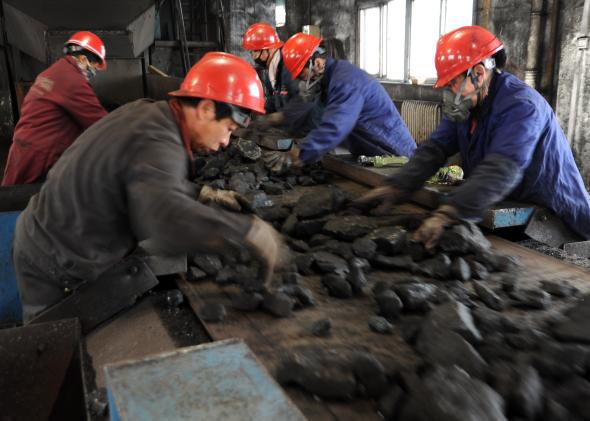The United States and China have announced a groundbreaking new pact to combat climate change by cutting their emissions in the coming decades. This, you might assume, would be considered terrible news for the fossil fuel industry.
So why on earth are coal stocks up today?
One possibility is that there’s just other good news in the world keeping share prices afloat. (Hey guys, seaborne coal prices might rise 40 percent by 2020!) A more likely explanation, though, is that the new deal—while incredibly significant from a diplomatic standpoint—doesn’t actually change much for coal merchants. Take China. The country has pledged that by 2030, it will stop its CO2 emissions from growing and obtain 20 percent of electricity from zero-carbon sources like nuclear, wind, and solar. It’s crucial that the government is making a firm, public commitment on this front, because it could influence the behavior of other heavy coal-burning countries. But Chinese officials may just be putting down in writing what was bound to happen anyway. Researchers at the Lawrence Berkeley National Laboratory, for instance, have predicted that Chinese emissions would peak between 2025 and 2030.
And some believe that Chinese coal use, in particular, is bound to level off much, much sooner—both because the country is finally getting serious about dealing with the environmental catastrophes brought on by its industrialization, and because in the long run, its electricity use can only grow so much. Last year, Citigroup’s Ed Morse, one of the most respected analysts in the fossil fuel world, argued that China would hit peak coal prior to 2020, far faster than the U.S. government had previously expected. In September, the Carbon Tracker Initiative released a report stating that China’s use of thermal coal would top out sometime between this year and 2016. The Sierra Club believes that Chinese coal use has already dipped a bit, though it’s by no means the clear start of a permanent decline.
There are, of course, dissenting voices. Analysts at Wood Mackenzie say they think Chinese coal consumption will double by 2030. But, by now, it seems likely that energy company investors would at least have priced in the possibility that China’s appetite for coal wouldn’t expand forever. Without a truly shocking announcement, there’s no reason to start selling off shares.
The same goes for the United States. Thanks largely to cheap natural gas, American coal consumption has already declined, and the Obama administration is moving aggressively to cut it further through new rules on power plant emissions. The new goal President Obama announced in Beijing—to slash new greenhouse gases 26 to 28 percent from 2005 levels by 2025—isn’t a radical departure from the direction we were already going in. And, given that Republicans are about to have complete control over Congress (and might for a very long while), it’s not clear how much the administration will be able to speed up its climate-fighting agenda.
Again, the fact that the world’s two largest carbon emitters, which have traditionally sparred on global warming, were able to reach an accord on emissions is an enormous development. It may inspire other developing countries, like coal-loving India, to step up their own fight against climate change. But as of now, the deal hasn’t given fossil fuel investors much reason to fume.
